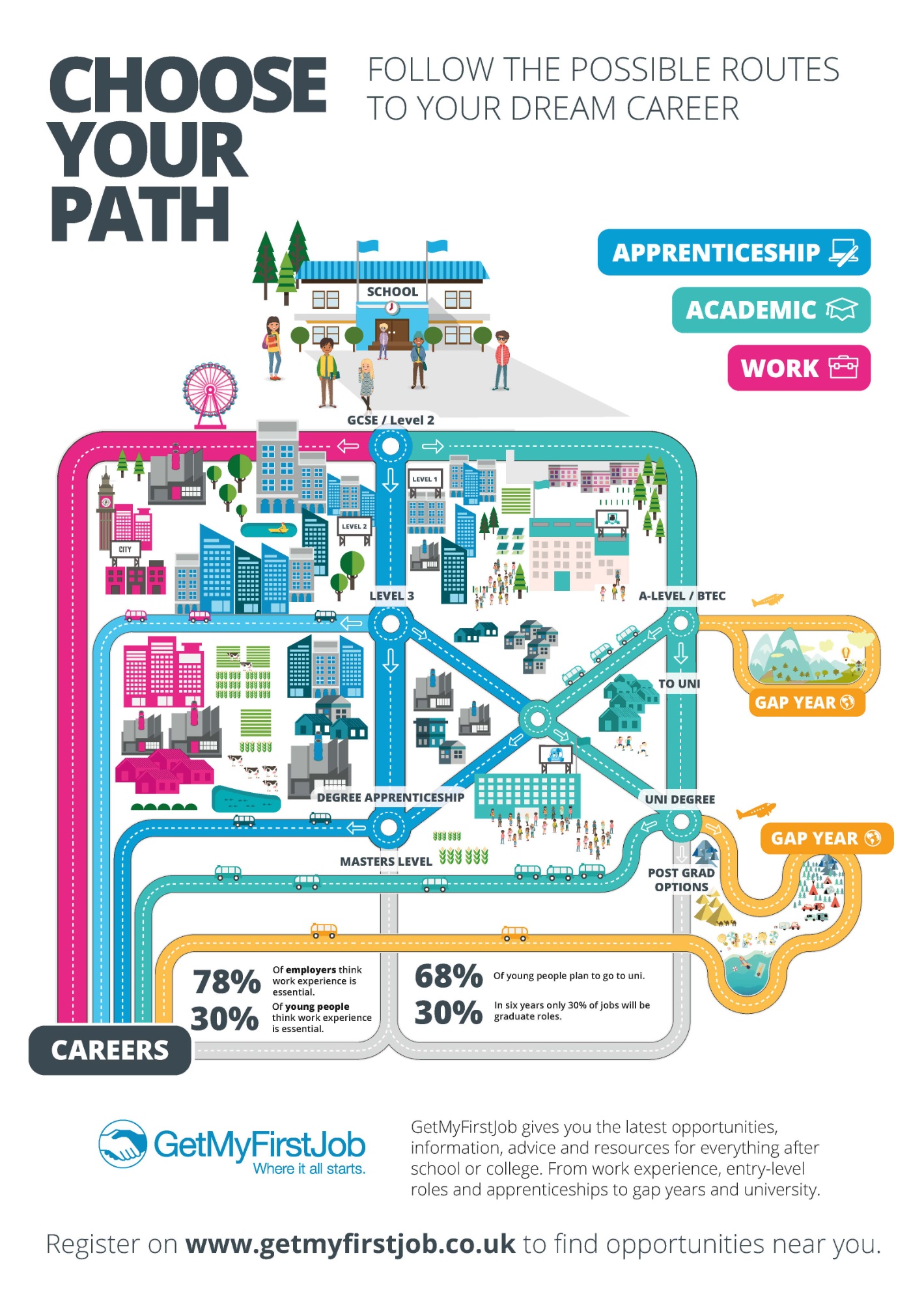Careers and Guidance
Careers Leader: Mrs K Fyles
Career Advisor and Careers Lead Assistant: Mrs L Underdown Qualified to: Level 6 Diploma in Career Guidance and Development
Please contact the above by email or on 0115 9252698
Please click here to book a careers appointment.
What to expect from a careers appointment
Your career appointment is for you. You set the agenda, and you can use the time to explore whatever is an issue for you in moving forward with planning your career.
A careers appointment is part of your process to figure out what are your next steps in education and employment. This process is often ongoing and might change throughout your life. The role of a careers advisor is to help facilitate this process and enable you to develop the skills to plan your career. Ultimately, it will be your efforts and actions that will enable progress.
A careers advisor will help you with career questions that you may. You may not walk away with all the answers to your questions but you should be closer to finding them.

Common questions that we hear include:
-
I don’t know what I want to do for my career, how do I find out?
-
What options are there other than University?
-
If I do a vocational course, can I still go to University?
-
What College courses are available?
-
Will I be eligible for the Disabled Student’s Allowance if I go to University?
-
How do I apply to an apprenticeship?
A careers advisor may:
-
Explore your values, motivations and interests
-
Gently challenge your beliefs
-
Encourage you to reflect on your skills and experience
-
Share with you resources and activities to help your career research
-
Help you to weigh up your options
-
Help you to gain answers to your questions
A careers advisor cannot:
-
Make a decision for you
-
Tell you what career is right for you
-
Tell you which employers are recruiting
-
Tell you everything about a particular career
To make sure you get the most out of your appointments, think about what your goal is for the appointment, make sure this is realistic. Doing even a bit of research and reflection goes a long way in preparing for your appointment. If you think you will need more than one appointment, ask for it.
Pathways - Information
As you move through education to employment, there are multiple pathways you can take. Which pathway you choose depends on a number of things, for example, how you prefer to learn, whether you know what job you want to do and what grades you achieve.
You can move between different pathways with a little planning. For example, you may complete your A-levels and then go on to complete a degree apprenticeship. Alternatively, you may complete a vocational level 3 course, such as a BTEC National Extended Diploma and then go on to do a University degree. Knowing what qualifications are required for different courses and jobs enables you to plan ahead and to keep your options open.
The National Careers Service has some amazing information about making career choices here.
Take a look at the ‘Choose Your Path’ poster below and take a look at the sections below to learn more about what interests you.

For an interactive overview of the different qualification types and what they mean, Click here.
Course search tools
GCSEs
This website describes what to consider when making your GCSE choices.
Apprenticeships
What are the different types of apprenticeship?
This web page describes the different levels of apprenticeship.
Can I still go to University after an apprenticeship?
This web page describes how you can move into University after you have done an apprenticeship and what you need to consider when planning this.
This quiz asks you questions to help you work out which apprenticeship might be right for you.
This search tool can be used to look for advertised apprenticeships in your local area.
Vocational Qualifications
What are vocational qualifications?
What are the differences between A levels and Vocational Qualifications?
Why choose a vocational route to work?
Why choose a vocational route to university level study?
Types of vocational qualifications
What are T levels? Watch this film on T Levels and here is a guide.
A Levels
Planning for A Levels in a coronavirus crisis
Why choose A Levels, what's involved?
Choosing your A Levels - what you need to consider
A Level students thinking about apprenticeships
Leaving before your A levels finish, what to do?
Why do an Extended Project Qualification (EPQ)?
What is the difference between A levels and vocational qualifications?
Considering Core Maths? - find out more
If you are planning on going to University after your A-levels, you can use this tool to help you decide what A-levels to do, based on what University degree you are interested in: What degree can I do with my A level subjects? At the same time, you might want to check out what you can do with this degree here: What can I do with my degree?
To see what A-levels we teach at Chilwell School, click here.

Career Planning
Skills reflection
Some skills are unique to a specific job, whilst others are transferable. Transferable skills are those that you can build up over time, through work, volunteering, education and life. You can apply them to a range of jobs and are great on CVs. They include being able to work in a group, use computer software and writing skills.
Watch this video to learn about the difference between ‘hard skills’ and ‘soft skills’:
Quizzes
You may want to take a careers/skills quiz to help you:
-
Reflect on what interests and motivates you
-
Think about your skills and experience
-
Find out what jobs suit your skills and interests
Use the ‘career planner quiz’ to match your skills, motivations and desires to careers.
Here there are both short and long career quizzes and a place to browse career paths. The short career quiz is a great way to reflect on how you like to work and what you value and enjoy- it will also suggest career pathways based on your answers.
Quiz provides an in-depth analysis of your skills, suggesting jobs based upon this. You can keep adding information to build upon your answers.
This quiz is great if you are starting to think about CVs. It asks you questions that get you to think about what skills and experience you have built so far and to work out what you can develop further. It also matches your answers to job areas.
This quiz is useful if you think you might like to start your own business. It asks you questions to help you see if starting a business is right for you.
Build skills and experience
Taking courses and doing work experience/volunteering are great ways to:
-
Build skills and experience, increasing your employability
-
Learn what motivates you, what you are good at doing and what you enjoy doing
-
Learn about what jobs are available and network
The National careers service has fantastic resources on how to build your skills here.
Also:
-
Check out the free online courses that you can do in your free time on Future Learn.
-
Virtual work experiences can be found on Springpod, Future Learn, and Speakers for Schools. Found out more about virtual work experience here.
-
You can volunteer for the NHS if you are older than 16 years here.
Contact friends and family to shadow them at work. This can help you to learn what aspects of a job and work environment you do and do not like and looks proactive on a CV.
Searching for jobs and careers
How do I find out about different jobs? CareerPilot provides a few ways to search different jobs, either by looking at job categories or by searching a subject that you are interested in.
Explore careers is a fantastic website to search any job to learn more about it. At the bottom of the page, they have listed jobs by different categories. Here you can search through the different categories that interest you to find out about jobs that you may not have heard of.
Labour market information is the information about the job market, such as job availability and job demand. Knowing answers to the below questions can inform what jobs we choose to take and the stability of our future career:
WHAT JOBS HAVE THE MOST GROWTH
WHICH OCCUPATIONS HAVE THE LOWEST UNEMPLOYMENT RATE?
A quick way of comparing this information is to use this tool, where you can type in any jobs to compare salaries and whether the job area is growing or declining.
' style="width: 915px; height: 460px;">You have not allowed cookies and this content may contain cookies.
If you would like to view this content please
SEND
In section 8 (pages 58-67) of this National Careers Service resource booklet, there are careers activities for SEND students.
A comprehensive guide to services and support for children and young people aged 0-25 with Special Educational Needs and Disabilities (SEND) at NottHelpYourself.
Futures For You can provide information, advice and guidance to help young people and adults to get into Employment, Education and/or Training. We have some bespoke coaches, specialising in supporting young people with SEND who can offer support to young people.
Making applications
Course applications
What is usually needed? Predicted grades, personal details such as your address, your school details and emergency contact details. Some courses ask to see a portfolio of work e.g. art and design courses.
Apprenticeship applications
What is usually needed? It usually varies with different employers, but generally a CV and either a cover letter or a personal statement.
How to write an apprenticeship cover letter.
How to make a winning apprenticeship application.
University applications
The UCAS website has a variety of resources to answer your questions about university applications.
If you are planning on going to University after your A-levels, you can use this tool to help you decide what A-levels to do, based on what University degree you are interested in: What degree can I do with my A level subjects? At the same time, you might want to check out what you can do with this degree here: What can I do with my degree?
Can I still go to University after an apprenticeship?
This web page describes how you can move into University after you have done an apprenticeship and what you need to consider when planning this.
Job applications
What is usually needed? It usually varies with different employers and job areas, but generally a CV and either a cover letter or a personal statement.
The National Careers service provides resources on how to apply to jobs.
Writing a CV
Tips For Students And School Leavers
5 top tips for writing a CV in 2021
Interview preparation
Tips for preparing for a job interview

You have not allowed cookies and this content may contain cookies.
If you would like to view this content please

